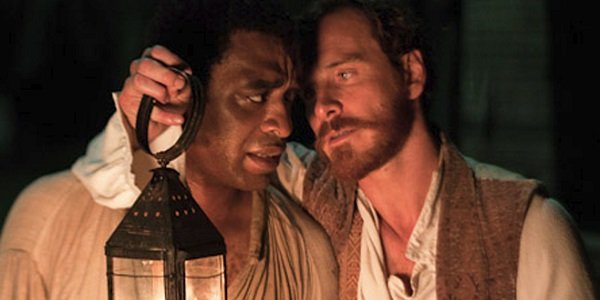For Your Consideration: 12 Years A Slave's Historical Importance Doesn't Automatically Make It The Best Picture

It is no easy task to stand here, covered in targets, claiming that one of the most important African American films in recent cinema is not the deserved Best Picture for this year’s Oscars. In the middle of Black History Month no less.
So let me start with an apologist’s backpedal, behavior that is certainly familiar where the subject of slavery is concerned. Steve McQueen’s 12 Years a Slave is absolutely one of the greatest films of the year, if not many years past, and while I don’t know if can say I loved it, given the often unsettling narrative, I was completely riveted by the long and bruising path that Solomon Northup (Chiwetel Ejiofor) was dragged down. The journey from beginning to end was a hard one, but it came across as well-earned by the time the credits rolled. I felt like I had experienced Northup’s trials and tribulations myself, stripped of my comparatively carefree life and sent into a world of tragedy and despair.
But no, that’s ridiculous, because I didn’t actually experience anything nearly as shattering as the malicious treatment Northup endured for his twelve-year servitude. In fact, with the two-month cushion sitting between now and my first viewing, I can barely recall the mental anguish I felt while watching it. And I’m not sure where this sense of diminishing emotion comes from.
Perhaps because McQueen didn’t over-dramatize Northup’s violent thrust away from his life as a free man, using a similarly simple tactic to unremarkably grant him back his freedom by the end of the film. These shifts weren’t jarring enough for me to feel a connection to his life before or after. I completely respect McQueen sticking to the memoir’s non-melodramatic nature, for it is this contemplative (rather than exploitative) approach to the material where 12 Years angles away from its parallels with slavery films and miniseries that we’ve seen in the past. But when the viewer is only given time to sit with its main character and think about the things that are happening to him, that’s when it stops transcending the material and reminds us that this is a movie about slavery.
To qualify that as a sub-genre of film sounds callous and reductive, as one probably wouldn’t limit their descriptions of other nominees The Wolf of Wall Street to "an addiction movie" and Gravity to "a space movie." But when all the unspecific adjectives like gripping, emotional and strengthening are taken away, the description is pretty much limited to the obvious. I blame my hatred of film loglines for this reliance on multi-threaded plotlines.
It’s a refreshing change of pace to have such a gutting drama told without the stereotypical villain inevitably facing off against the lead in some showdown, and it allows for a more realistic string of biased assholes to come in and out of Northup’s life with varying levels of intensity. But without a major conflict to grasp onto, my attention span was free from any feeling of anticipation. Calling this "one man’s fight against a million men’s plight" is certainly Best Picture-worthy, but we’re never really taken to an edge in 12 Years a Slave. I suppose you could count seeing nude, scarred-up slaves bathing edgy, or the unflinching scenes of whip-fueled abuse. But that material, when taken out of context, is no more disturbing than something in the climax of an indie horror. The tolerance of the viewer factors in here, of course.
And no, I’m not comparing this movie to direct-to-video schlock, but that comparison points at how important context is when considering 12 Years as a Best Picture. This is a film whose importance needs at least a sliver of independence from the subject matter it is talking about, without letting the heavy hand of slavery overwhelm the details of its merits. Is this film really the sum of so many amazing parts that it outperforms everything else we’ve seen this year?
Your Daily Blend of Entertainment News
One cannot consider the best film of an entire year without thinking ahead, wondering if a particular choice will retain its glory and sit high atop the mountain of cinema through future generations. A Best Picture should be so memorable that its name should come up instantly when asked. Through hindsight, we’ve often seen the Academy pick the "wrong films" to award its top honors, even when there aren’t any other clear frontrunners. If I’m feeling less interested in this pic after only two months, I can’t imagine the dwindling fondness I’ll feel for it twelve years down the road.
Many prestigious films come from unforgettable true stories, but there are even more that get lost in the critical mix and become mere footnotes. Should Steve McQueen’s 12 Years a Slave indeed beat out the other nominees for Best Picture, it will not be a crime against movies, and I will applaud a little harder than I would for most of the other nominees. This film is no footnote, but a rewarding chapter of filmmaking, with strong performances and gorgeous cinematography laying out a troubling tale of historical ignorance. It is indeed one of the best films of 2013. Just not THE best.

Nick is a Cajun Country native and an Assistant Managing Editor with a focus on TV and features. His humble origin story with CinemaBlend began all the way back in the pre-streaming era, circa 2009, as a freelancing DVD reviewer and TV recapper. Nick leapfrogged over to the small screen to cover more and more television news and interviews, eventually taking over the section for the current era and covering topics like Yellowstone, The Walking Dead and horror. Born in Louisiana and currently living in Texas — Who Dat Nation over America’s Team all day, all night — Nick spent several years in the hospitality industry, and also worked as a 911 operator. If you ever happened to hear his music or read his comics/short stories, you have his sympathy.
